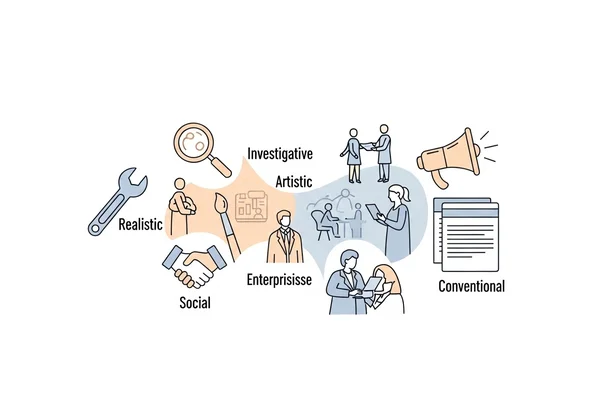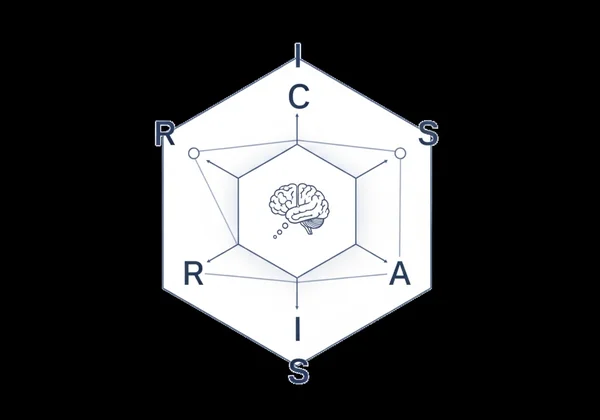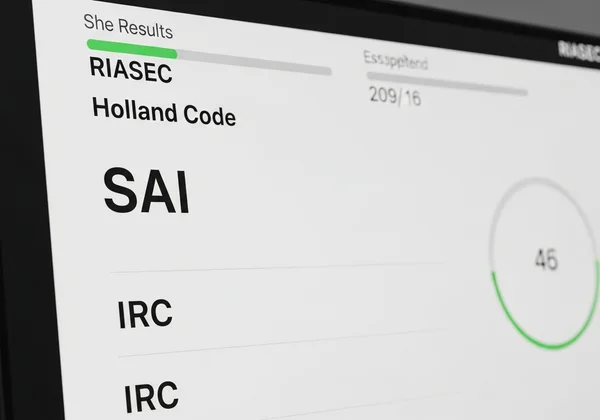RIASEC Test Explained: Holland's Theory for Career Clarity
August 4, 2025 | By Samuel Chen
Navigating the vast world of career choices can often feel like trying to find a single star in a galaxy. Many of us, whether we are students choosing a major or professionals considering a change, are searching for a reliable map. Have you ever wondered, what is the RIASEC test and how can it bring clarity to this journey? The answer lies in John Holland's powerful RIASEC Theory, a scientifically-backed framework that has guided millions toward fulfilling careers by connecting personality to profession. This guide will illuminate the core principles of this theory, its origins, and how you can use it to discover your path to career satisfaction.
What is Holland's RIASEC Theory?
At its heart, John Holland's RIASEC theory is a cornerstone of career counseling. It proposes a simple but profound idea: career choice is an expression of personality. The theory suggests that if we can match our personal interests and traits to a compatible work environment, we are more likely to experience success, satisfaction, and longevity in our careers. It provides a structured way to think about ourselves and the world of work, transforming a daunting task into a manageable exploration. The theory is built upon six key pillars that form the famous acronym.

The Six Distinct RIASEC Personality Types
Holland identified six primary personality and interest types, which serve as the foundation of his model. What do the RIASEC letters mean? Each letter corresponds to a unique category of interests, values, and skills.
- Realistic (R) - The Doers: Practical, hands-on individuals who enjoy working with tools, machines, and animals. They are often physical, mechanical, and value tangible results.
- Investigative (I) - The Thinkers: Analytical, curious, and observant people who excel at solving problems and working with ideas. They thrive on research, data, and scientific discovery.
- Artistic (A) - The Creators: Expressive, imaginative, and independent individuals who are drawn to unstructured environments. They flourish in creative pursuits like writing, music, and design.
- Social (S) - The Helpers: Empathetic, cooperative, and supportive people who enjoy teaching, helping, and empowering others. They are skilled communicators and thrive in collaborative settings.
- Enterprising (E) - The Persuaders: Ambitious, energetic, and sociable leaders who enjoy influencing, persuading, and managing others to achieve goals. They are often drawn to business and leadership roles.
- Conventional (C) - The Organizers: Detail-oriented, efficient, and methodical individuals who excel at working with data and following established procedures. They value precision and reliability.
The Origins of Holland's Vocational Interest Theory
So, who created RIASEC? This influential model was developed by American psychologist Dr. John L. Holland in the 1950s. While working as a military and university counselor, he observed that people naturally gravitated toward professions that allowed them to express their personalities. This insight led him to develop his Theory of Vocational Choice, which systematically categorized both people and work environments into the six types. His goal was to create a practical tool for vocational guidance that was both easy to understand and scientifically sound, a goal that continues to empower career seekers today.
Exploring the Holland Hexagon Model
To visualize the relationships between the six personality types, Holland created the Holland Hexagon Model. This geometric representation is more than just a simple diagram; it's a predictive tool that offers deep insights into career compatibility. The six types are arranged on the points of a hexagon in the order R-I-A-S-E-C, revealing a fascinating and useful structure.

Understanding the Hexagon's Structure and Relationships
The placement of each type on the hexagon is deliberate. The distance between any two points on the hexagon indicates how similar or different those types are. Types that are adjacent to each other (e.g., Realistic and Investigative, or Social and Enterprising) share more in common. An individual with high scores in adjacent types is said to have a "consistent" interest pattern. In contrast, types that are opposite each other on the hexagon (e.g., Realistic and Social) are the most dissimilar. Understanding these relationships is a key part of interpreting the results from an online riasec test.
How the Hexagon Predicts Career Fit and Satisfaction
The Holland Hexagon is a powerful predictor of job satisfaction and stability. The theory posits that when your personality type aligns with your work environment's type, you're more likely to thrive. For instance, an Artistic person (A) working in a structured, Conventional (C) environment like data entry may feel stifled and unfulfilled. Conversely, that same person would likely flourish in a design studio or theater. The model helps you identify environments where your skills will be valued and your interests will be engaged, directly answering the question, "How can the RIASEC test guide your career?"
RIASEC Theory's Enduring Impact on Career Planning
For decades, the career planning landscape has been shaped by Holland's work. Its principles are embedded in countless career centers, guidance programs, and online tools worldwide. The theory’s longevity is a testament to its clarity, utility, and scientific backing, making it a timeless resource for anyone navigating their professional life.
From Concept to Comprehensive Career Assessments
Holland's theory was never meant to remain purely academic. It was designed for practical application, leading to the development of powerful career assessments like the Strong Interest Inventory® and the Self-Directed Search (SDS). Today, this legacy continues with accessible online tools that deliver immediate insights. A modern riasec career test can generate your unique three-letter Holland Code (e.g., SAI, IRC), providing a personalized snapshot of your core interests and pointing you toward a list of well-matched occupations and educational paths.

Why Holland's Theory Remains Relevant for Modern Career Guidance
In a rapidly changing job market, Holland's theory is more relevant than ever. It provides a stable foundation for self-understanding that transcends specific job titles. Instead of focusing on a single "dream job," it encourages you to understand the types of activities and environments where you will excel. This flexible approach empowers you to adapt, whether you're a student choosing a field of study, a professional seeking new opportunities, or a career advisor guiding a client.
Applying Holland's Theory for Your Career Journey
Understanding the theory is the first step; applying it is where the transformation begins. By discovering your personal Holland Code, you gain a powerful lens through which to view your past experiences and future possibilities. It provides a vocabulary to describe what truly motivates you, helping you make more intentional and confident decisions.
Identifying Your Own Holland Code
The most direct way to apply this theory is to find your unique combination of the six types. Your Holland Code is typically represented by the three letters corresponding to your highest scores. This code is your personal career DNA. The best way to discover it is by taking a scientifically designed holland code test. These assessments ask about your preferences across a wide range of activities to generate a reliable profile of your interests. Are you ready to get your Holland Code and unlock personalized insights?
Maximizing Your Career Exploration with RIASEC
Once you have your Holland Code, the real career exploration can begin. Use your code as a guide to research matching careers and fields of study. For example, if your code is "Investigative, Realistic, Conventional" (IRC), you might explore careers in data science, lab technology, or engineering. Use your results to craft a resume that highlights your core strengths and to prepare for interviews by articulating why you are a good fit for a particular work environment. It's a tool for continuous growth and discovery.
Charting Your Path with RIASEC Theory
John Holland's RIASEC theory offers more than just a personality label; it provides a comprehensive and trusted framework for a lifetime of career discovery. From understanding the six core types to using the Holland Hexagon to predict your fit, this model empowers you to align who you are with what you do. It moves you from a state of confusion to one of clarity and confidence.
The journey to a fulfilling career begins with self-knowledge. By applying this enduring theory, you can make smarter educational choices, find more satisfying work, and build a professional life that is a true reflection of your interests. Ready to take the next step? Take the free RIASEC test today and start your journey toward a richer, more rewarding career.
FAQ Section: Frequently Asked Questions About John Holland's RIASEC Theory
What is the primary purpose of the RIASEC theory?
The primary purpose of the RIASEC theory is to facilitate career choice and development. It operates on the principle that matching an individual's personality and interests to a congruent work environment leads to greater satisfaction, success, and stability. It's a foundational tool for vocational guidance theory used by counselors and individuals alike.
How accurate is the RIASEC test based on Holland's theory?
Decades of research have shown that assessments based on Holland's theory are highly reliable and valid predictors of career interests and occupational choice. While no test is a perfect crystal ball, a well-designed riasec test provides a very accurate reflection of your core interests. It serves as an excellent starting point for career exploration, and you can validate your results by exploring the career suggestions it provides.
Can the RIASEC theory help with choosing a college major?
Absolutely. Choosing a college major is one of the most effective applications of the theory. Your Holland Code can point you toward fields of study that align with your interests, increasing your chances of academic success and satisfaction. For example, a Social type might thrive in psychology or education, while an Investigative type might excel in engineering or biology. Discovering your interests early can save time and help you build a solid foundation for your future career.
Is the RIASEC theory connected to other personality tests like MBTI?
Yes, there are interesting correlations between RIASEC and other personality models like the Myers-Briggs Type Indicator (MBTI). While they measure different things—RIASEC focuses on vocational interests and MBTI on cognitive preferences—they can be used together for a more holistic self-understanding. For instance, an "Artistic" type might also be an "INFP" on the MBTI. However, for direct career and education matching, the RIASEC model is often considered more specific and actionable. To see how your interests translate into career paths, we recommend a free career interest test.